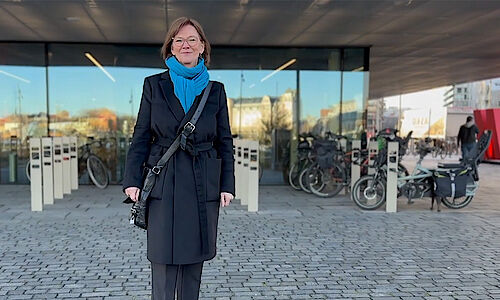News & Academies' activities
EASAC's Energy Steering Panel reviews Japan's nuclear disaster and Europe's response
Such were the repercussions of a severe earthquake and its accompanying tsunami at the Fukushima nuclear power station on March 11, 2011 that it led governments, including Germany's, to re-assess their nuclear energy priorities.
EASAC's Energy Steering Panel (ESP) met at Frankfurt on May 3 in co-operation with the German Academy of Sciences Leopoldina to review key reports prepared by the Leopoldina on the scientific and international implications of German proposals to reduce its nuclear energy provision. This special meeting of ESP was fortified by senior scientists and altogether a dozen European countries were represented together with the EASAC President, Brian Heap, the Leopoldina President, Jörg Hacker, and the EASAC Vice-President and ESP Chair, Sven Kullander. The Panel's deliberations compiled by the Panel's Secretary, John Holmes, are briefly summarised here.
Germany's status as a major European economy, and with its exemplary leadership in tackling climate change was acknowledged by the ESP. However, an early phase out of nuclear power, which currently contributes around 23% of Germany's power generation, raises serious questions about the provision of energy from alternative sources while meeting Germany's targets for reductions in greenhouse gas emissions. If other countries followed Germany's lead and all of Europe's nuclear power were to be replaced by fossil fuels, CO2 emissions would increase by 20% rather than decrease by 20% which is the EU target for 2020. The immediate closure of some nuclear power stations in Germany has already resulted in increased imports of electricity from other countries, France and the Czech Republic in particular.
A recurrent theme was the need for a pan-European view in respect of energy policy, the energy system and energy research. The EU is committed to integrated gas and electricity markets by 2014, and the development of the necessary European transmission infrastructures. These physical and market integrations are crucial elements for Europe, and could be of great help to Germany in meeting its future energy needs and in ensuring a stable electricity grid.
Similarly, the EU recognises that the magnitude of the energy challenge requires a concerted R&D effort at a European level. Its Strategic Energy Technology Plan (SET) has been put in place, and given the importance of German R&D activities within SET, its continuing support is essential to a successful outcome; such initiatives include the nuclear fission and fusion research undertaken through the Euratom programmes.
The German studies of energy research presented in the Leopoldina reports, reviewed by the ESP, were impressive for their breadth and depth of analysis, and the level of consultation that underpinned them. The ESP emphasized that decisions on energy systems need to be informed by a systematic and quantitative evaluation of the options, including the timescales demanded by different scenarios. This will ensure that decisions are firmly grounded in practical realities. Reduction of risks in one area, e.g. phase-out of nuclear, can lead to increased risks in another, e.g. insecurity of gas supplies, and increased climate change risks from higher fossil fuel use etc.
It was strongly recommended by the meeting that further quantitative analysis of the options should be undertaken to inform public debate before decisions on the phase-out of nuclear power are finalised; however, a political announcement on 30 May signalled a 2022 phase-out.
Research priorities highlighted by the ESP from its ongoing deliberations were:
- basic research in areas such as nanoscience, materials and bioscience that may be the source of future breakthroughs in energy technologies.
- integrated European electricity grid (see EASAC's report on "Transforming Europe's Electricity Supply");
- increased efficiency of energy through closer integration of social and technical expertise in order to avoid rebound effects;
- concentrating solar power (the subject of a current EASAC study), given the potential resources available in Southern Europe and North Africa;
- carbon capture and storage, which will become more important if Germany places increased emphasis on fossil fuels due to an early nuclear phase-out;
- reduction in the cost of renewable technologies and increased capability for rapid, large-scale deployment;
The ESP's final word is for a strong voice for science in the current debate. European nations face no easy choices or simple technological "fixes" if a future reliable supply of energy is to be consistent with a substantial reduction in greenhouse gas emissions. It is essential that policy makers are supplied with the best scientific, technical and engineering advice, and that there is recognition of the need for behavioural and societal change to secure the future of later generations.
Professor Sir Brian Heap
President
<link fileadmin docs council_meetings ec0611_04__energy_steering_panel_review_090511.doc download file>Energy Steering Panel Review 090511
back to overview































